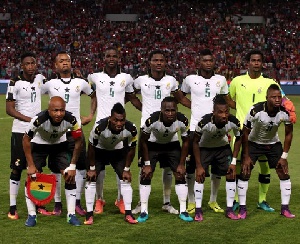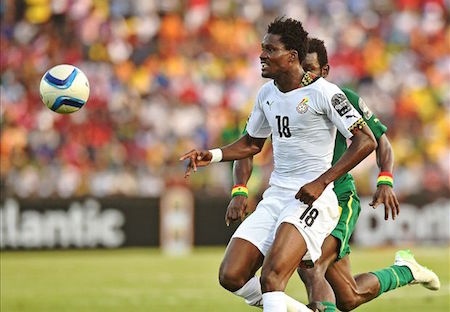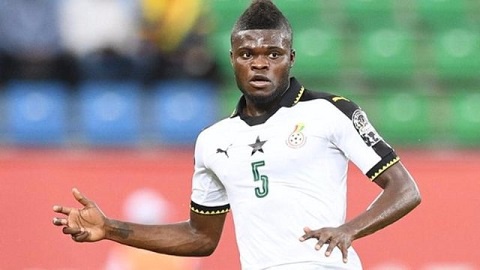 Black Stars failed to qualify for the World Cup for the first time since 2006
Black Stars failed to qualify for the World Cup for the first time since 2006
Ghana’s world cup dream died even before it was over the past weekend. For all the protests about South African referee Daniel Bennett’s decision not to award a penalty and disallow what looked a clean goal against Uganda, every Ghanaian football fan knew the die was cast long before that disastrous refereeing performance in Kampala.
Disastrous is an adjective that will describe Ghana’s world cup qualifying campaign too. The Black Stars had appeared at three straight world cups on a simple formula in the past; create a fortress at home, become very difficult to beat away but all that was thrown out of the window.
When Zambia, Egypt, Burkina Faso and South Africa were all dispatched with consummate efficiency at home in Kumasi in the past, Uganda and Congo collected two points and denied Ghana four this term. It was not Bennett’s calls that robbed Ghana of a world cup place. It was Ghana that robbed Ghana of a world cup place.
It is an overplayed theory but failure like that always provides a springboard to the next level and Ghana has traditionally made the most of that.
Failure to reach the 2004 Nations Cup was the final catalyst that inspired wholesale changes and inspired Ghana to a first ever world cup in 2006 with Stephen Appiah, Michael Essien, Sulley Muntari and others at the forefront.
When Milovan Rajevac was faced with a raft of injuries and acutely aware of the failure to win Nations Cup at home in 2008, he tweaked things and gave birth to a team dominated by U-20 products Jonathan Mensah, Dede Ayew and others.
The mix with experience was powerful and the benefit at the 2010 world cup as Ghana reached the quarter-final of the world cup was evident. Kwesi Appiah has a similar opportunity and already he appears to be taking it well.

Kwesi Appiah
When Appiah took over with five points behind Egypt, he has what looked like an incredibly difficult mission. Then when he was offered a chance by Egypt’s in Uganda to close the gap, he fluffed it with a draw at home against Congo.
That was his failure but his recovery since then has been impressive. A 5-1 hammering of Congo in Brazzaville, a draw against Uganda where Ghana had lost the last three games and a 3-0 win over Saudi Arabia. The contrasting results in his those three games also speak to the contrasting approaches.
Against Congo Appiah took the easy option out, avoided making difficult calls and picked teams any Ghanaian could name; Dede Ayew, Jordan Ayew, Asamoah Gyan and all the regular names. When he was forced into dropping some of those names by injury and later his own will, team seemed to have a life.
So who have been the big winners from particularly the last two international games?

Daniel Amartey
He was accused of using tribal considerations to pick teams after he dropped the Ayew brothers and Mubarak Wakasso and his competence heavily pummeled. Yet in recent weeks he has fought back. He has brought in new players who have shone through. Nicholas Opoku and Kasim Nuhu both looked assured in the centre of defence, Patrick Twumasi showed great endeavour in Saudi Arabia and there was evidence from Kingsley Sarfo that he may, after all, be worth the hype.
The lesson in all this for Appiah is simple. Sometimes you have to be prepared to shake up the existing order. Now he has the ammunition to make this team truly his own again.
Amartey may struggle to get games at Leicester City but with Ghana he is a main man. He led by example in Kampala from center back, winning key battles and looked good at right back against Saudi Arabia. That was in addition to another fine display at center back away in Congo. With all the fuss about captaincy, Amartey is making his case for long-term leadership in the most efficient way.

Thomas Partey
Partey has scored four goals in his last three Ghana games and provided three assists. In those games too when he has played in an advanced midfield role, he has shown he can effectively carry this team even if the evidence is not conclusive. It is not yet on the epic Michael Essien or Stephen Appiah scale but he is getting there.
We used to mock Avram Grant for template call-ups and labelled some of Kwesi Appiah’s selection “fre fre ko bo” to suggest not much thought went into the call-ups. Yet Nicholas Opoku, Kasim Nuhu, Patrick Twumasi, Kingsley Sarfo and the returning Daniel Opare have done enough to at least force Appiah into a lot more thinking when he has to name his next squad, which is actually a very good thing.